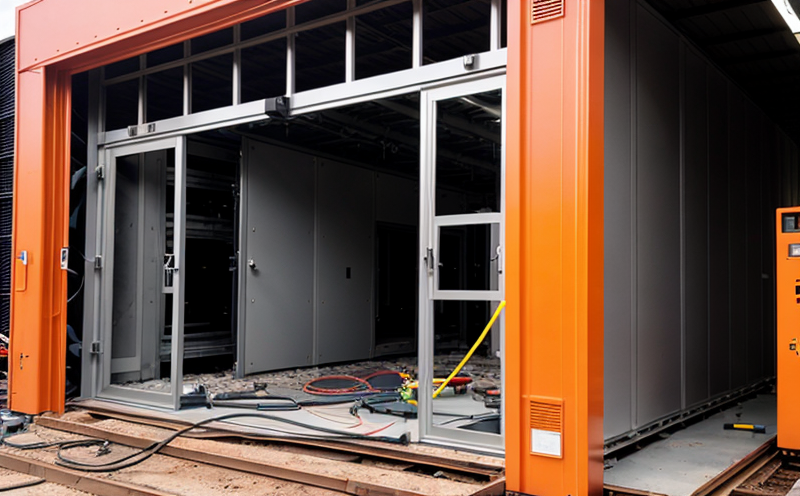UNE EN 50342 Thermal Safety Testing of Lead-Acid Automotive Batteries
The UNE EN 50342 standard is a critical tool in ensuring the safety and reliability of lead-acid automotive batteries. This European standard specifies methods for testing the thermal stability, overcharging behavior, and short-circuit conditions of these batteries to ensure they meet stringent safety requirements.
Thermal management is one of the most pressing concerns in the automotive industry today, especially as battery technologies evolve. Lead-acid batteries are no exception, and ensuring their safe operation under various thermal stresses is essential for both consumer protection and compliance with international regulations.
The test protocol outlined in UNE EN 50342 involves several stages designed to simulate real-world scenarios that a battery might encounter during use. These include overcharging tests, short-circuiting tests, and high-temperature storage tests. Each of these tests aims to identify potential thermal hazards that could lead to dangerous situations such as overheating or fire.
For the overcharging test, batteries are subjected to a charging current higher than their nominal capacity for extended periods. This simulates scenarios where users may accidentally leave their vehicles unattended with the engine running and lights on, leading to excessive battery charging. The standard specifies precise conditions under which this can be done safely without causing any risk.
Short-circuit tests are conducted by connecting two terminals of a discharged battery together through a low-resistance path for a specified duration. This simulates accidental short circuits that could occur due to faulty connections or manufacturing defects. The test checks if the battery can withstand such conditions without catching fire or exploding.
The high-temperature storage test involves placing fully charged batteries in an environment maintained at elevated temperatures over several days. This helps determine how well the battery performs under extreme heat, which is crucial for understanding its long-term durability and safety.
- Overcharging tests: Simulate accidental overcharging scenarios to ensure batteries do not catch fire or explode.
- Short-circuiting tests: Assess the ability of a battery to handle unexpected short circuits safely.
- High-temperature storage tests: Evaluate the performance and safety under extreme heat conditions.
Quality and Reliability Assurance
The implementation of UNE EN 50342 thermal safety testing is essential for ensuring consistent quality and reliability across all lead-acid automotive batteries. By adhering to this standard, manufacturers can demonstrate their commitment to producing safe products that meet international safety standards.
Quality assurance in battery manufacturing involves several key steps:
- Raw Material Selection: Ensuring the use of high-quality raw materials is critical. Poor quality components can lead to issues during thermal testing.
- Manufacturing Process Control: Strict control over the manufacturing process ensures that each battery undergoes consistent treatment, reducing variability and enhancing reliability.
- Post-Manufacture Testing: Comprehensive testing after production guarantees that every unit meets or exceeds the specified standards before being shipped to customers.
Reliability assurance focuses on ensuring that batteries perform consistently under expected conditions throughout their lifecycle. This involves:
- Data Collection: Gathering data from various stages of production and testing provides insights into any potential weaknesses in the design or manufacturing process.
- Continuous Improvement: Using the collected data to identify areas for improvement helps manufacturers continually enhance their products, leading to better performance and longer lifespan.
Customer Impact and Satisfaction
The implementation of UNE EN 50342 thermal safety testing directly impacts customer satisfaction by providing peace of mind. Knowing that their vehicles are equipped with batteries that have passed rigorous safety tests reassures customers about the reliability and safety of their products.
Customer satisfaction is further enhanced through:
- Enhanced Reputation: Compliance with international standards boosts brand reputation, making it easier for manufacturers to enter new markets.
- Reduced Risk of Product Liability Claims: By ensuring that batteries meet safety requirements, the risk of product liability claims is significantly reduced.
- Increased Customer Loyalty: Satisfied customers are more likely to remain loyal and recommend products to others.
Competitive Advantage and Market Impact
Compliance with UNE EN 50342 provides a significant competitive advantage by setting higher safety standards than many competitors. This can:
- Increase Brand Loyalty: Customers are more likely to choose products from companies that demonstrate a commitment to safety.
- Open New Markets: Meeting international standards opens up new markets and opportunities for growth.
- Enhance Corporate Image: A strong corporate image is crucial in attracting investors, partners, and other stakeholders.





